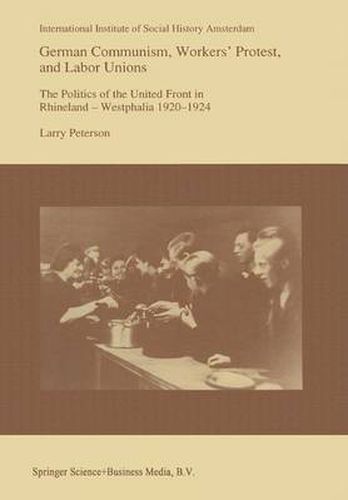Readings Newsletter
Become a Readings Member to make your shopping experience even easier.
Sign in or sign up for free!
You’re not far away from qualifying for FREE standard shipping within Australia
You’ve qualified for FREE standard shipping within Australia
The cart is loading…






This title is printed to order. This book may have been self-published. If so, we cannot guarantee the quality of the content. In the main most books will have gone through the editing process however some may not. We therefore suggest that you be aware of this before ordering this book. If in doubt check either the author or publisher’s details as we are unable to accept any returns unless they are faulty. Please contact us if you have any questions.
This book analyzes how a sizable group of Gennan workers came to support Communism and how they in turn influenced the emergence and development of the German Communist Party (KPD) in its fonnative period as a mass party. It reconstructs the interaction between a party and the constituency to which it appealed within the constraints and opportunities set by social structures, econo mic conditions, and political competitors. This interaction revolved around the elaboration and implementation of a specific concept of revolutionary politics, and this study investigates both the rise of the KPD as a mass party and its failure to set off a socialist revolution in the early 1920s in light of the contradictory ways German workers responded to its revolutionary strategy. When I began to study the KPD in the mid 1970s, scholarly works in the West portrayed a party so out of touch with the realities of German life from 1918 to 1933 that its history was a litany of political mistakes that led from crisis to catastrophe. The KPD was dominated by the foreign policy interests of the Soviet Union, by factional disputes and personal rivalries among the leadership, by an authoritarian, centralized party structure that stifled rank-and-file initiative and imposed a party line determined in Moscow and Berlin, and by a rigid ideology largely irrelevant to trends in German economy, society, and politics with at best compensatory value for a minority of the most impoverished workers.
$9.00 standard shipping within Australia
FREE standard shipping within Australia for orders over $100.00
Express & International shipping calculated at checkout
This title is printed to order. This book may have been self-published. If so, we cannot guarantee the quality of the content. In the main most books will have gone through the editing process however some may not. We therefore suggest that you be aware of this before ordering this book. If in doubt check either the author or publisher’s details as we are unable to accept any returns unless they are faulty. Please contact us if you have any questions.
This book analyzes how a sizable group of Gennan workers came to support Communism and how they in turn influenced the emergence and development of the German Communist Party (KPD) in its fonnative period as a mass party. It reconstructs the interaction between a party and the constituency to which it appealed within the constraints and opportunities set by social structures, econo mic conditions, and political competitors. This interaction revolved around the elaboration and implementation of a specific concept of revolutionary politics, and this study investigates both the rise of the KPD as a mass party and its failure to set off a socialist revolution in the early 1920s in light of the contradictory ways German workers responded to its revolutionary strategy. When I began to study the KPD in the mid 1970s, scholarly works in the West portrayed a party so out of touch with the realities of German life from 1918 to 1933 that its history was a litany of political mistakes that led from crisis to catastrophe. The KPD was dominated by the foreign policy interests of the Soviet Union, by factional disputes and personal rivalries among the leadership, by an authoritarian, centralized party structure that stifled rank-and-file initiative and imposed a party line determined in Moscow and Berlin, and by a rigid ideology largely irrelevant to trends in German economy, society, and politics with at best compensatory value for a minority of the most impoverished workers.